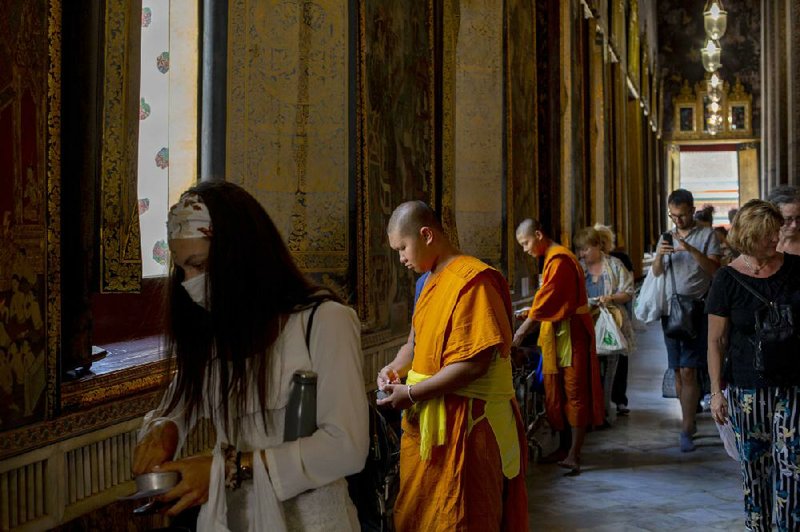MANILA, Philippines -- In a Catholic church in the Philippines, nearly half of the pews were empty for Sunday Mass. The few hundred worshippers who showed up were asked to refrain from shaking hands or holding them during prayers to prevent the spread of the virus that started in China.
In Hong Kong, Cardinal John Hon Tong, wearing a mask, announced the suspension of public Masses for two weeks and urged churchgoers to instead watch them online.
Buddhist temples, Christian churches and Muslim mosques have been ordered closed since Jan. 29 in mainland China, where the new coronavirus strain was first detected in the central city of Wuhan, the epicenter of the outbreak. Mosques have canceled weekly Friday prayers since January under an order to avoid "collective religious activities."
Religious leaders should encourage Muslims to "trust the party" and avoid crowds, the Communist Party-controlled body that oversees China's officially authorized mosques said in a statement.
In Japan, where Buddhist temples and Shinto shrines are tourist destinations, a sharp decline in the number of foreign visitors has been a palpable setback. At normally popular Suzumushi, or Crickets, temple, a sign read, "Due to the impact of the COVID-19, no waiting expected," using the name given to the disease by the World Health Organization.
"We assimilate with parishioners and many other people. We know that the talk of the town is really this virus and it's obvious that many are scared," said the Rev. Siegfred Arellano, a priest at the Binondo church in the Philippine capital's Chinatown.
Attendance at Masses, Arellano said, "has really dropped."
After consulting health experts, the Catholic Bishops Conference of the Philippines announced steps late last month to fight the virus. Churchgoers were advised to avoid hand contact and receive the Eucharist, which symbolizes the body of Jesus Christ, in the hand instead of the mouth.
They said holy water should be replaced more often in church and a protective cloth installed on the grills separating priests and worshippers in confessional boxes.
In Hong Kong, Tong initially approved precautions that included a choice for churchgoers to watch Sunday Mass online. Those who opted to go to churches were asked to wear masks and told that "singing is suspended," except for short hymns like "Allelulia." The new virus is spread through respiratory droplets, according to health officials.
Tong later announced the two-week suspension of Masses, saying the move was crucial to suppressing the outbreak, and asked Hong Kong's 400,000-strong Catholic community not to panic.
Masses in Singapore's Catholic churches have also been suspended indefinitely starting Saturday to contain the spread of the virus.
Crowds also have thinned at Bangkok's popular Wat Pho, a centuries-old Buddhist temple complex known for its giant reclining Buddha. The temple is normally visited by thousands of tourists, many of them Chinese, during the peak travel season from December to February.
A Protestant church in Seoul shut its doors and switched entirely to online worship services after one of its followers tested positive for the virus on Jan. 30.
Other Protestant churches in South Korea have sprayed their halls and rooms with disinfectant, canceled children's Bible school programs and asked followers to minimize socializing.
"The virus can't dampen my faith," said Rey Gilber, a 55-year-old father of two who went to Mass at the Binondo church in Manila with his family. "God is always there and won't abandon us."
A key mosque in Malaysia's administrative capital of Putrajaya and two other mosques briefly closed their doors last month to non-Muslim visitors amid the virus scare, but later reopened after Prime Minister Mahathir Mohamad called the move irresponsible.
Tens of thousands of ethnic Hindus, meanwhile, gathered last weekend to celebrate an annual festival called Thaipusam in the central Malaysian state of Selangor, undeterred by the outbreak.
Still, hundreds of staff and temple workers along with two dozen ambulances stood by. Emergency medical outposts were established as a precaution at the Batu Caves temple on a limestone hill, where pilgrims and tourists descended to watch devotees pierce their skin with hooks and skewers and carry offerings up a flight of 272 steps to the temple.
"We will not get the virus because God exists here," said Saratha, a 60-year-old housewife.
Information for this article was contributed by Aaron Favila, Joeal Calupitan, Kiko Rosario, Preeyapa Khunsong, Ken Moritsugu, Joe McDonald, Kim Tong-hyung, Hyung-jin Kim, Mari Yamaguchi, Eileen Ng and Niniek Karmini of The Associated Press.
A Section on 02/16/2020

